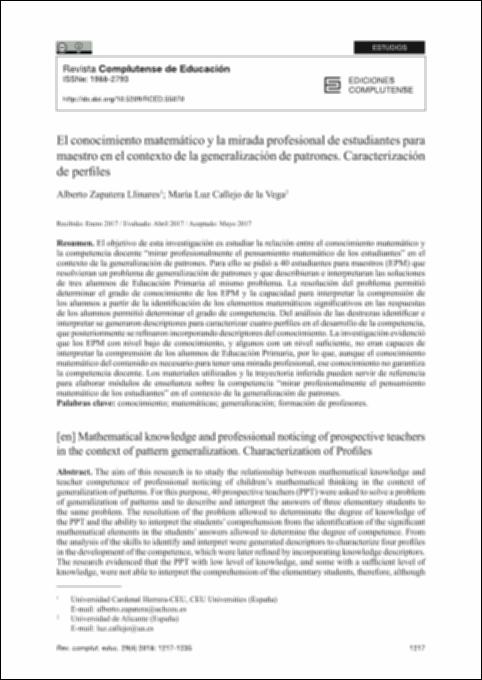Please use this identifier to cite or link to this item:
http://hdl.handle.net/10637/9997El conocimiento matemático y la mirada profesional de estudiantes para maestro en el contexto de la generalización de patrones : caracterización de perfiles
| Title: | El conocimiento matemático y la mirada profesional de estudiantes para maestro en el contexto de la generalización de patrones : caracterización de perfiles |
| Other Titles: | Mathematical knowledge and professional noticing of prospective teachers in the context of pattern generalization : characterization of profiles |
| Authors : | Zapatera Llinares, Alberto Callejo de la Vega, María Luz |
| Keywords: | Mathematics teachers - Occupational training.; Mathematics - Education (Primary); Matemáticas - Enseñanza primaria.; Profesores de matemáticas - Formación profesional. |
| Publisher: | Universidad Complutense de Madrid. |
| Citation: | Zapatera Llinares, A. y Callejo de la Vega, María Luz. (2018). El conocimiento matemático y la mirada profesional de estudiantes para maestro en el contexto de la generalización de patrones : caracterización de perfiles = Mathematical knowledge and professional noticing of prospective teachers in the context of pattern generalization : characterization of profiles. Revista Complutense de Educación, vol. 29, n. 4, pp. 1217-1235. DOI: http://dx.doi.org/10.5209/RCED.55070 |
| Abstract: | El objetivo de esta investigación es estudiar la relación entre el conocimiento matemático y la competencia docente “mirar profesionalmente el pensamiento matemático de los estudiantes” en el contexto de la generalización de patrones. Para ello se pidió a 40 estudiantes para maestros (EPM) que resolvieran un problema de generalización de patrones y que escribieran e interpretaran las soluciones de tres alumnos de Educación Primaria al mismo problema. La resolución del problema permitió determinar el grado de conocimiento de los EPM y la capacidad para interpretar la comprensión de los alumnos a partir de la identificación de los elementos matemáticos significativos en las respuestas de los alumnos permitió determinar el grado de competencia. Del análisis de las destrezas identificar e interpretar se generaron descriptores para caracterizar cuatro perfiles en el desarrollo de la competencia, que posteriormente se refinaron incorporando descriptores del conocimiento. La investigación evidenció que los EPM con nivel bajo de conocimiento, y algunos con un nivel suficiente, no eran capaces de interpretar la comprensión de los alumnos de Educación Primaria, por lo que, aunque el conocimiento matemático del contenido es necesario para tener una mirada profesional, ese conocimiento no garantiza la competencia docente. Los materiales utilizados y la trayectoria inferida pueden servir de referencia para elaborar módulos de enseñanza sobre la competencia “mirar profesionalmente el pensamiento matemático de los estudiantes” en el contexto de la generalización de patrones. / The aim of this research is to study the relationship between mathematical knowledge and teacher competence of professional noticing of children’s mathematical thinking in the context of generalization of patterns. For this purpose, 40 prospective teachers (PPT) were asked to solve a problem of generalization of patterns and to describe and interpret the answers of three elementary students to the same problem. The resolution of the problem allowed to determinate the degree of knowledge of the PPT and the ability to interpret the students’ comprehension from the identification of the significant mathematical elements in the students’ answers allowed to determine the degree of competence. From the analysis of the skills to identify and interpret were generated descriptors to characterize four profiles in the development of the competence, which were later refined by incorporating knowledge descriptors. The research evidenced that the PPT with low level of knowledge, and some with a sufficient level of knowledge, were not able to interpret the comprehension of the elementary students, therefore, although the mathematical knowledge of the content is necessary to have a professional noticing, this knowledge does not guarantee the teaching competence. The materials used and the inferred trajectory can be used as a reference to compose teaching modules about the competence of professional noticing of children’s mathematical thinking in the context of generalization of patterns. |
| Description: | Este artículo se encuentra disponible en la página web de la revista en la siguiente URL: https://revistas.ucm.es/index.php/RCED/article/view/55070/4564456548257 |
| URI: | http://hdl.handle.net/10637/9997 |
| Rights : | http://creativecommons.org/licenses/by/4.0/deed.es |
| ISSN: | 1988-2793. |
| Issue Date: | 1-Oct-2018 |
| Center : | Universidad Cardenal Herrera-CEU |
| Appears in Collections: | Dpto. Ciencias de la Educación |
Items in DSpace are protected by copyright, with all rights reserved, unless otherwise indicated.


